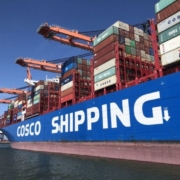Cosco and OOCL u-turn on pledge not to call at ports in Israel
Cosco Shipping Lines and its subsidiary, OOCL, have apparently backtracked on halting calls to Israeli ports.
In December, Cosco announced that Israel-bound services would be suspended due to “operational difficulties”.
Both lines are still calling at Haifa and Ashdod ports, with long-haul shipments facilitated through transhipment at Piraeus in Greece and Velncia in Spain.
In Haifa, Cosco and OOCL use the SIPG Bayport Terminal, operated by the China state-owned Shanghai International Port Group.
Israel’s transport ministry was said to have questioned why Cosco halted calls, although it appeared that it was due to the difficulties of accessing the country through the Red Sea, due to the risk of Houthi attacks.
Israeli publication Globes, citing sources, said the decision had created a “diplomatic fuss”, with China’s ambassador to Israel, Cai Run, being summoned to a meeting by the foreign affairs ministry in January. Globes reported that Israel’s Ministry of Foreign Affairs was striving to keep shipping lanes to Israel open and wanted to resolve the situation with the Chinese state-owned shipping group.
Iran is supporting the Houthi rebels, but China is the largest importer of Iranian crude oil, which implies Chinese ships are unlikely to be harmed, even if they call at Israeli ports. The precarious situation in the region has seen several ships broadcasting AIS messages saying they are not going to Israel or that they have an all-Chinese crew.
From Wednesday, Cosco and OOCL will be starting their Mediterranean feeder service by adding a ship to Zim Line’s Tyrrhenian Container Service. Cosco has been taking slots on the Zim service since November.
The loop connects Ashdod, Haifa, Fos, Genoa and Salerno and has a three-week rotation with three 1,100-1,400 teu ships. Cosco will deploy the 1,223 teu Frederik to join Zim’s 1,134 teu Asiatic King and 1,421 teu Navi Baltic.
Meanwhile, Cosco has been using the 13,092 teu Cosco Development for extra feedering between Piraeus and Belgium’s Zeebrugge port as tonnage continues to be held up by diversions round the Cape of Good Hope. The ship was taken out of the Chinese operator’s transatlantic service and substituted with the 8,063 teu OOCL Seoul.





